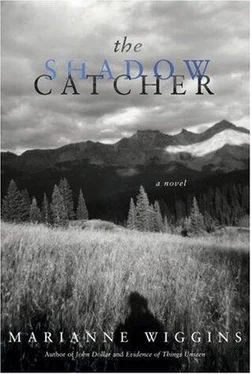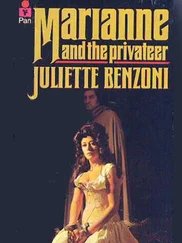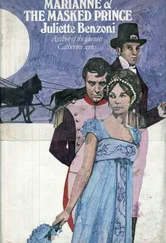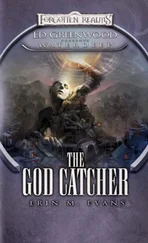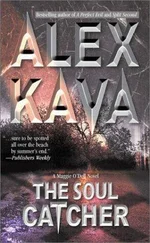She was thinking of her parents. “With the one you love,” she said.
“I would rather die alone.”
“—why?”
He looked at her again.
“Do you want someone to watch you die?”
She helped him into the pyjama top—
(“Where did you find this—?”
“I went to your room.”) — and then she helped him urinate into the chamber pot from a sitting position on the edge of the bed, each physical transaction being almost technical between them until she said, “I saw your photographs,” and he grabbed her hand.
“I didn’t invite you.”
“You didn’t not invite me, Edward.”
“They are not for others’ eyes.”
“Well, too late. I saw them.”
She pressed him back against the pillows, straightening his spine, until he was at an angle with the least amount of pressure on his hip.
“Why are they blue?”
“I can’t afford to purchase silver.” On her look he said, “The prints you saw are called cyanotypes. Poor man’s proofs. A non-silver process. Using iron. And cyanide. Developed by the sun. From glass plate negatives,” he told her. She had no idea what he was talking about but he gripped her hand again. “Your father was an artist, you must tell me what you think.”
“I think they’re beautiful,” she said. “And brave.”
“So I’ll ask again: do you think there is a living to be made from this?”
“—a living?”
“Livelihood.”
“A life, perhaps, Edward. Certainly, a life.”
“Lives are what we have right now. I want something more.”
She almost answered So do I but the way he looked at her already sealed the pact between them of mutual, if still unspoken, ambition. How do you make the life you want? she wondered. Talent, her father used to say, is more abundant than you think. You have to have the temperament to tolerate hard work. You have to flirt with luck. You have to take the chances that most people wouldn’t take.
“I’m not certain that making a wage should be your foremost consideration in entertaining the prospect of a life in art,” she told him. “Traditionally, artists are not wealthy men. The people who commission them are.”
“Then how do I attract these wealthy people? The ones who will commission me?”
“Establish in a city, Edward. In Seattle. No one is going to find you here.”
“I don’t want to be another of those men you see, traveling house to house, ‘Your portrait, Miss, on tin for a few pennies…’I don’t want to spend my life immortalizing babies, brides and corpses.”
“—then what do you want?”
His gaze left her, went inward. “I don’t even know if the photographs I make are passable,” he fretted. “Within the range of the profession. Or even, for that matter, pleasing.”
She realized that she couldn’t offer him advice, that she didn’t understand the process of photography, that it differed in every way conceivable from what she knew about techniques involved in painting, except for one: both forms existed on a flat plane distorted by illusion to suggest a third dimension. What her father couldn’t do — why he’d failed to gain commissions in those final years — was the portrait work of strangers. His portrait of Amelia evoked a strong sense of her beauty, an inspired likeness, but even with someone he loved he had not been able to seize upon that look that was her very essence, to capture her soul. As his work had matured toward impressionism he had lost his sure hand at straightforward drawing, lost his earlier enthusiasm for the literal translation of a portrait painter’s art and the truth was he wasn’t any good at rendering a likeness, setting up a mirrored image of a stranger’s soul. So, “Learn to make a portrait, Edward,” was the only thing that she could think to tell him. “Whether you want to or not. Whether you want to be that salesman at the train depot selling tintypes for pennies, learn to take the sort of photographs that speak the truth about their subjects. The sort of photographs that people travel with, keep in their pockets, the kind they’d never dream of parting with or leaving behind. Practice on me — I’m used to sitting for my father — or practice on yourself…”
“You speak your mind, don’t you, Scout? A rare find in a woman.”
“—then ask yourself how you would render that, that quality about me, in a photograph.”
For the second time, he almost smiled.
“I must see to chores—” she said.
“—don’t go.”
“—well if I don’t you and I will have no supper and the chickens and the mule will starve.”
She placed Gulliver’s Travels in his hands and stacked more books from the Icarus chest beside him. In a short while she had fed and watered all the animals, peeled potatoes, rolled a dough and placed a green apple cobbler in the oven. The sky outside burned over Seattle, and by the time supper was ready it was a bright light in the darkening canopy. They ate boiled potatoes, roasted ramps and smoked fish off trays in the bedroom while she read to him from the Swift novel, and then for dessert she served the green apple cobbler with clotted cream and a splash of rough apple brandy she’d been fermenting in a jug. She asked him to explain the photographic process to her and she had to lengthen wicks in both the lanterns several times as they talked into the night until, perhaps as a result of the apple brandy, she could no longer suppress her yawns. She stood.
“—where are you going?”
“I’ll sleep in Eva’s room. The walls are thin — well you know that, you built them — just call out if—”
“Sleep here.”
He patted the bedsheet beside him.
She looked around, involuntarily, as if someone else were watching. “Edward, I—”
And then, extraordinarily, he smiled, although that, too, may have been the apple brandy.
That first night they touched only a few times, Edward reaching for her hand to press against his hip after she had turned the lantern down, but she was so afraid of the unknown, of a stranger in the bed, that for a long while in the dark she barely breathed. She was surprised, then, to discover at the dawn her face pressed to his back and her arm across his chest, his fingers intertwined with hers. And then, as she lay watching, she felt him come awake, lift their arms together and kiss her hand.
“I’m going to walk today. You promised.”
“I promised we would try .”
But Edward wasn’t one for trying anything without succeeding.
Even before he would allow her to make breakfast he insisted on trying to stand but she succeeded in advising him against it without first trying to put pressure on his leg and hip from a prone position. There was no further inflammation nor discoloration when she examined him and the first thing she asked him to do was to try to bend his knee into his chest—“ Slowly ,” she cautioned — then she worked his bended knee in slow rotation. When this caused him some discomfort she advised staying off his feet for several more days but as she stood before the stove a while later, making biscuits, Edward hobbled in using his walking stick.
“You are a damn fool, Edward Curtis,” she warned him.
“—but a walking one.”
His face bled of color and she saw his leading arm begin to shake.
“—I’ll need your help if I’m to stay up any longer…” and as he almost fell she caught his sudden weight against her shoulder and guided him back down the hall and back to bed. All through that second day he exercised at intervals, frequently with her support, and by suppertime he was standing on his own, if only for brief moments, without the walking stick. She read to him, they talked, he told her how he’d first become impassioned with photography. “Ten years ago, now, and Mr. Curtis and I were on the circuit up in northern Minnesota—”
Читать дальше
